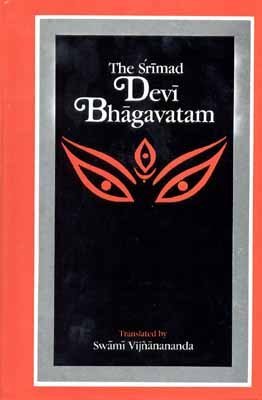The Devi Bhagavata Purana
by Swami Vijñanananda | 1921 | 545,801 words | ISBN-10: 8121505917 | ISBN-13: 9788121505918
The English translation of the Devi Bhagavata Purana. This Sanskrit work describes the Devi (Divine), the Goddess, as the foundation of the world and as identical with Brahman, the Supreme Being. The Devi Bhagavata Purana is one of the most important works in Shaktism, a branch of Hinduism focusing on the veneration of the divine feminine, along w...
Chapter 2 - On the conversation between Nārada and the Bindhya Mountain
1-6. The Devī said :-- “O King! O Mighty armed One! All these I grant unto you. Whatever you have asked for, I give them to you. I am very much pleased with your hard Tapasyā and with your Japam of the Vāgbhava Mantra. Know Me that My power is infallible in killing the Lords of the Daityas. O Child! Let your kingdom be free from enemies and let your prosperity be increased. Let your devotion be fixed on Me and in the end you will verily get Nirvāṇa Mukti.” O Nārada! Thus granting the boon to the highsouled Manu the Great Devī disappeared before him and went to the Bindhya Range. O Devarṣi! This Bindhya mountain increased in height so much so that it was well nigh on the way to prevent the course of the Sun when it was arrested by Mahārṣi Agastya, born of a kumbha (water jar). The younger sister of Viṣṇu, Varadeśvarī, is staying here as Bindhyavāsinī. O Best of the Munis! This Devī is an object of worship of all.
7-8. Saunaka and the other Ṛṣis said :-- O Sūta! Who is that Bindhya Mountain? And why did He intend to soar high up to the Heavens to resist the Sun’s course? And why was it that Agastya, the son of Mitrāvaruṇa quietened that rising mountain? Kindly describe all these in detail.
9-15. O Saint! We are not as yet satisfied with hearing the Glories of the Devī, the ambrosial nectar, that have come out of your mouth. Rather our thirst has been increased.
Sūta said :-- O Ṛṣis! There was the Bindhya Mountain, highly honoured and reckoned as the chief of the mountains on the earth. It was covered with big forests and big trees. Creeping plants and shrubs flowered these and it looked very beautiful. On it were roaming deer, wild boars, buffaloes, monkeys, hares, foxes, tigers and bears, stout and cheerful, with full vigour and all very merrily. The Devas, Gandharbhas, Apsarās, and Kinnaras come here and bathe in its rivers; all sorts of fruit trees can be seen here. On such a beautiful Bindhya Mountain, came there one day the ever joyful Devarṣi Nārada on his voluntary tour round the world. Seeing the Mahārṣi Nārada, the Bindhya Mountain got up and worshipped him with pādya and arghya and gave him a very good Āsana to sit. When the Muni took his seat and found himself happy, the Mountain began to speak.
16-17. Bindhya said :-- “O Devarṣi! Now be pleased to say whence you are coming; your coming here is so very auspicious! My house is sanctified today by your coming. O Deva! Your wandering is, like the Sun, the cause of inspiring the beings with freedom from fear. So, O Nārada! Kindly give out your intention as to your coming here which seems rather wonderful.”
18-28. Nārada said :-- “O Bindhya! O Enemy of Indra! (Once the mountains had a very great influence. Indra cut off their wings and so destroyed their influence. Hence the mountains are enemies of Indra). I am coming from the Sumeru Mountain. There I saw the nice abodes of Indra, Agni, Yama, and Varuṇa. There I saw the houses of these Dikpālas (the Regents of the several quarters), which abound in objects of all sorts of enjoyments.” Thus saying, Nārada gave out a heavy sigh. Bindhya, the king of mountains, seeing the Muni heaving a long sigh, asked him again with great eagerness, “O Devarṣi! Why have you heaved such a long sigh? Kindly say.”
Hearing this, Nārada said :-- “O Child! Hear the cause why I sighed. See! The Himālayā Mountain is the father of Gaurī and the father-in-law of Mahādeva; therefore he is the most worshipped of all the mountains. The Kailāśa Mountain again, is the residence of Mahādeva; hence that is also worshipped and chanted as capable of destroying all the sins. So the Niṣadha, Nīla, and Gandhamādana and other mountains are worshipped at their own places. What more than this, that the Sumeru Mountain, round whom the thousand-rayed Sun, the Soul of the universe, circumambulates along with the planets and stars, thinks himself the supreme and greatest amongst the mountains, “I am the supreme; there is none like me in the three worlds.” Remembering this self-conceit of Sumeru, I sighed so heavily. O Bindhya! We are asceties and though we have no need to discuss these things, yet by way of conversation I have told this to you. Now I go to my own abode.”
Here ends the Second Chapter of the Tenth Book on the conversation between Nārada and the Bindhya Mountain in the Mahā Purāṇam Śrī Mad Devī Bhāgavatam of 18,000 verses by Mahārṣi Veda Vyāsa.
